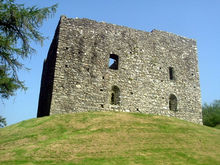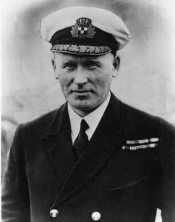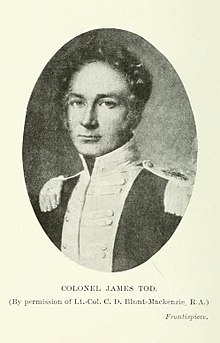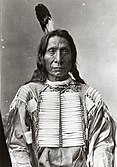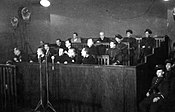Portal:History
The History Portal
History (derived from Ancient Greek ἱστορία (historía) 'inquiry; knowledge acquired by investigation') is the systematic study and documentation of the human past. History is an academic discipline which uses a narrative to describe, examine, question, and analyze past events, and investigate their patterns of cause and effect. Historians debate which narrative best explains an event, as well as the significance of different causes and effects. Historians debate the nature of history as an end in itself, and its usefulness in giving perspective on the problems of the present.
The period of events before the invention of writing systems is considered prehistory. "History" is an umbrella term comprising past events as well as the memory, discovery, collection, organization, presentation, and interpretation of these events. Historians seek knowledge of the past using historical sources such as written documents, oral accounts or traditional oral histories, art and material artifacts, and ecological markers.
Stories common to a particular culture, but not supported by external sources (such as the tales surrounding King Arthur), are usually classified as cultural heritage or legends. History differs from myth in that it is supported by verifiable evidence. However, ancient cultural influences have helped create variant interpretations of the nature of history, which have evolved over the centuries and continue to change today. The modern study of history is wide-ranging, and includes the study of specific regions and certain topical or thematic elements of historical investigation. History is taught as a part of primary and secondary education, and the academic study of history is a major discipline in universities.
Herodotus, a 5th-century BCE Greek historian, is often considered the "father of history", as one of the first historians in the Western tradition, though he has been criticized as the "father of lies". Along with his contemporary Thucydides, he helped form the foundations for the modern study of past events and societies. Their works continue to be read today, and the gap between the culture-focused Herodotus and the military-focused Thucydides remains a point of contention or approach in modern historical writing. In East Asia a state chronicle, the Spring and Autumn Annals, was reputed to date from as early as 722 BCE, though only 2nd-century BCE texts have survived. The title "father of history" has also been attributed, in their respective societies, to Sima Qian, Ibn Khaldun, and Kenneth Dike. (Full article...)
Featured picture
Did you know (auto generated)

- ... that Timo Meier became the first player in San Jose Sharks franchise history to score five goals in one game when he was 25?
- ... that Cliff Christl, who became the Green Bay Packers team historian in 2014, estimated that he had recorded more than 250 oral histories with past players and coaches since the 1990s?
- ... that 25 years after her career ended, Jennifer Martz remains second in NCAA Division III history in hitting percentage?
- ... that the bankruptcy of Penn Central in 1970 was the largest in American history at the time?
- ... that the historical-romance novel My Tender Matador includes a fictionalized version of the attempted assassination of Augusto Pinochet?
- ... that in 2007, Arthur Gray's £2 Kangaroo and Map stamp sold for a world record price for a single Australian stamp?

Master Juba (ca. 1825 – ca. 1852 or 1853) was an African-American dancer active in the 1840s. He was one of the first black performers in the United States to play onstage for white audiences and the only one of the era to tour with a white minstrel group. His real name was believed to be William Henry Lane, and he was also known as "Boz's Juba" following Dickens's graphic description of him in American Notes.
As a teenager, he began his career in the rough saloons and dance halls of Manhattan's Five Points neighborhood, moving on to minstrel shows in the mid-1840s. "Master Juba" frequently challenged and defeated the best white dancers, including the period favorite, John Diamond. At the height of his American career, Juba's act featured a sequence in which he imitated a series of famous dancers of the day and closed by performing in his own style. Being a black man, he appeared with minstrel troupes in which he imitated white minstrel dancers caricaturing black dance, obscuring his underlying ethnic identity with blackface . Even with his success in America, his greatest success came in England. (Full article...)
On this day
November 6: Gustavus Adolphus Day in Estonia, Finland and Sweden
- 1217 – King Henry III of England issued the Charter of the Forest, re-establishing the rights of access of free men to royal forests.
- 1794 – French Revolutionary Wars: Two British ships were intercepted by a French squadron, leading to the French seizure of the HMS Alexander.
- 1868 – Red Cloud (pictured), a Native American leader of the Oglala Lakota tribe, signed the Treaty of Fort Laramie, ending Red Cloud's War and establishing the Great Sioux Reservation.
- 1917 – First World War: Canadian forces captured Passendale, Belgium, after three months of fighting against the Germans at the Battle of Passchendaele.
- 1988 – Two earthquakes occurring 12 minutes apart struck Yunnan near the China–Myanmar border, killing more than 730 people.
- Nasta Rojc (b. 1883)
- Jerry Yang (b. 1968)
- Emma Stone (b. 1988)
- Anthony Sawoniuk (d. 2005)
Selected quote
There cannot be two suns in the sky, nor two emperors on the earth.
— Confucius, Chinese Sage and Philosopher
Related portals
More Did you know...
- ... that the anti-religious campaign culminating in the Stalinist show trial of the Kraków Curia (pictured) led to the imprisonment of 123 Polish Roman Catholic priests in just one year?
- ... that Confederate brigadier general Alfred E. Jackson was pardoned by President Andrew Johnson because of his kindness toward Johnson's family during the Civil War?
- ... that after HMS Porcupine was nearly split in two by a torpedo, the halves were nicknamed HMS Pork and HMS Pine?
- ... that the Experiment was a boat powered by horses running on a treadmill and propelled by a then-novel type of screw propeller?
- ... that one of the highest-ranking generals in China was injured in battle nine times?
- ... that in Mesopotamian mythology, the Apkallu were sent by the god Enki, from Dilmun to teach human beings various aspects of civilization?
- ... that Karl Marx's theory of historical trajectory attempted to prove the long-term unsustainability of capitalism?
- ... that in November 1921, the schooner Cymric collided with a tram in Dublin?
Topics
Categories

History • By period • By region • By topic • By ethnic group • Historiography • Archaeology • Books • Maps • Images • Magazines • Organizations • Fictional • Museums • Pseudohistory • Stubs • Timelines • Chronology • People • Wikipedia historians
WikiProjects
![]() WikiProject History •
Ancient Near East • Australian History • Classical Greece and Rome • Dacia • Former countries • History of Canada • Chinese history • European history • Heraldry and vexillology • Indian history • Jewish history • Medieval Scotland • Mesoamerica • Military history • Middle Ages • History of Science
WikiProject History •
Ancient Near East • Australian History • Classical Greece and Rome • Dacia • Former countries • History of Canada • Chinese history • European history • Heraldry and vexillology • Indian history • Jewish history • Medieval Scotland • Mesoamerica • Military history • Middle Ages • History of Science
WikiProject Time • Days of the Year • Years
WikiProject Biography • Composers • Political figures • Saints • United States Presidents
Things you can do
 |
Here are some tasks awaiting attention:
|
Associated Wikimedia
The following Wikimedia Foundation sister projects provide more on this subject:
-
Commons
Free media repository -
Wikibooks
Free textbooks and manuals -
Wikidata
Free knowledge base -
Wikinews
Free-content news -
Wikiquote
Collection of quotations -
Wikisource
Free-content library -
Wikiversity
Free learning tools -
Wiktionary
Dictionary and thesaurus









